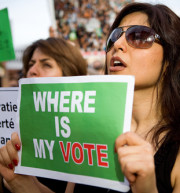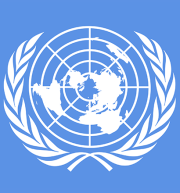
United Nations Special Rapporteur Maina Kiai told the UN General Assembly yesterday that vibrant freedoms of assembly and association are absolute prerequisites to “genuine elections” that reflect the will of the people. The remarks came yesterday in New York, where Kiai presented his first report to the General Assembly in his capacity as the Special Rapporteur on the freedoms of assembly and of association. The report documents worldwide threats to the freedoms of assembly and of association in the context of elections – before, during and after the vote. “Electoral periods are a key period in the life of any nation,” Kiai told the UN body. “But simply holding an election is not enough: the quality of the process has a significant impact on the legitimacy of the outcome.” Kiai said that international election monitoring efforts tend to focus solely upon what happens during the vote, and do not always take into account the entire human rights landscape. A press release is available here. Video of the event is available here via the UN. Kiai's portion starts at approximately 1h 24m... Continue reading →

A piece by Maina Kiai has been featured today in the Guardian's Poverty Matters blog. As he prepares to present his latest report -- which is on the freedoms of peaceful assembly and of association in the context of elections -- to the UN General Assembly in New York, Kiai argues that the international community should stop endorsing flawed elections that amount to "civilian coups." He calls upon UN member states to improve their efforts to facilitate and protect assembly and association rights during all phases of elections. Click here for a link to the... Continue reading →

United Nations Special Rapporteur Maina Kiai will appear before the UN General Assembly on Oct. 29 to present a key report on worldwide threats to freedom of assembly and associations during election periods. Kiai’s presentation will begin at 3 p.m. (US Eastern Standard Time), and will be broadcast live on the UN website, webtv.un.org. The report documents a growing crackdown on assembly and association rights during election periods, and contends that such measures threaten to “indelibly stain” the legitimacy of democracy in some countries. It concludes that genuine elections cannot be achieved if the rights to freedom of peaceful assembly and of association are curtailed. “Election periods are a time for people to express the collective will and confer legitimacy on governments,” said Kiai, who is the UN Special Rapporteur on the freedoms of peaceful assembly and of association. “But if people are not allowed space to express that will, it undermines the legitimacy of the process. And that calls into question the legitimacy of the government itself.” The report calls upon UN member states to improve efforts to facilitate and protect assembly and association rights during election periods, and to be particularly vigilant in relation to the needs of groups which are at greater risk... Continue reading →

United Nations Special Rapporteur Maina Kiai is scheduled to speak at two public events in Canada this week, ahead of his presentation to the UN General Assembly in New York on Oct. 29. The first lecture – “Civil Society: Democracy, Dissent and the Law” – will take place on Oct. 23 at McGill University. The event is part of the university’s Macnaughton Lectures series, and will be hosted by the McGill Center for Human Rights and Legal Pluralism. The lecture is free and open to the public, and will be held at Chancellor Day Hall, Maxwell Cohen Moot Court (NCDH 100), 3644 rue Peel, Montreal. It is scheduled to take place from 5:30 p.m. to 7 p.m. For more information on the Montreal event, please see here. http://www.youtube.com/watch?v=g3TrjwEtIFM The second lecture – “The Right to Protest: A Worldwide Perspective” – will be held at 5 p.m. on Oct. 24 at the University of Ottawa. It is being presented by the Centre for International Policy Studies (CIPS), the Canadian Council for International Co-operation (CCIC), and Amnesty International Canada. The lecture is free and open to the public, and will be held at the Social Sciences Building, 120 University Street, room 4004. For more information on the Ottawa event, please see... Continue reading →

Three United Nations independent experts, including Maina Kiai, have urged the Azerbaijani Government to recognize and facilitate the work of human rights defenders and civil society organizations in the run up to the Presidential elections, due to take place on October 9, 2013. “All demonstrations complying with international human rights standards should be allowed and facilitated, and peaceful gatherings should not face the use of excessive force and administrative detention against demonstrators, even if such assemblies are not authorized,” the UN Special Rapporteur on the rights to freedom of association and peaceful assembly, Maina Kiai. “In times of elections, States should make greater efforts to facilitate and protect the exercise of the core rights to freedom of peaceful assembly and association,” he said, referring to the presentation of his new report to the General Assembly later this month. “Amendments to the law on Freedom of Assembly adopted in 2012 have tightened the existing restrictions to the right to assemble peacefully, including by increasing penalties for those organizing rallies,” he stressed. Azerbaijan has extended a standing invitation to the independent experts of the Human Rights Council, something which the experts welcomed. The UN Special Rapporteur on the... Continue reading →

Elections are a unique moment in the life of any nation, determining the direction of policies and priorities. No other event better exemplifies the right to public participation. And no other time requires more robust exercise and protection of the freedoms of assembly and association. Worldwide, however, space for dissent is shrinking around election time - whether it is harassment of civil society groups in Zimbabwe, death threats against activists in Nicaragua, or smear campaigns against election monitors in Malaysia. This report - the the Special Rapporteur's first to the UN General Assembly - documents countless threats to the freedoms of assembly and expression in the context of elections. The report's most critical finding is deceptively simple: elections do not take place in a vacuum, and their quality cannot be judged solely by what happens during the vote. We must also examine what happens before and after elections, and survey the long-term rights landscape, particularly the rights to freedom of peaceful assembly and association. People should be given more space – not less – to exercise their assembly and association rights. The Special Rapporteur believes that threats to freedom of assembly and association during election periods should be among our deepest concerns, because elections... Continue reading →

A group of United Nations independent human rights experts today warned that unreasonable limitations placed on the right of Iranian citizens to stand for Presidential office, discrimination against women candidates for elections and ongoing restrictions on freedoms of expression, association and peaceful assembly, constitute a serious violations of rights guaranteed by international law. On 21 May, the Guardian Council, a 12-member body of theologians and jurists, which vets presidential candidates, approved only 8 individuals out of the 686 people registered as candidates for the June 14 presidential elections. Several key political figures and all the 30 female candidates were disqualified, raising serious concerns about the fairness and transparency of the vetting procedures. Several candidates were apparently excluded on the basis of their affiliation with the 2009 post-election protests and their exercise of fundamental human rights, including the rights to freedom of expression, assembly and association. “This mass disqualification including that of women wishing to stand in the presidential elections is discriminatory and violates fundamental right to political participation, and run contrary to the International Covenant on Civil and Political Rights, which Iran has ratified,” said the... Continue reading →

Maina Kiai and two other United Nations Special Rapporteurs urged today the Government of Zimbabwe to respect international human rights norms and standards pertaining to freedoms of association, of peaceful assembly and of expression in the run up to the constitutional referendum on 16 March and subsequent elections which may take place next July. As Zimbabwe is entering a critical electoral period, the three international human rights experts have received increasing numbers of reports about acts of intimidation and harassment, physical violence and arrests against civil society actors, mostly working on human rights issues. “In the context of proposed constitutional reforms and the elections, it is disturbing and shocking to learn that civil society organizations that have been operating for years, including election monitoring groups which aim to promote free and fair elections, have been searched by police,” said the Special Rapporteur on the rights to freedom of peaceful assembly and of association, Maina Kiai. “Search procedures must not be applied selectively, and the right to privacy needs to be respected. Otherwise, the independence of associations and the safety of their members will be seriously at risk,” he emphasized. For several months, a number of civil society... Continue reading →

On the second anniversary of the house arrest, the Special Rapporteur on the situation of human rights in Iran, the Special Rapporteur on the rights to freedom of peaceful assembly and of association and the Chair-Rapporteur of the Working Group on Arbitrary Detention called for the immediate release of two key opposition leaders in Iran, Mir Hossein Mousavi and Mehdi Karoubi and their family members. The Special Rapporteurs also expressed concerns about the detention of two daughters of Mr Mossavi, Ms Zahra Mossavi and Ms Nargis Mossavi, who were reportedly detained today after speaking out against their parents’ house arrest. “I urge the Iranian government to immediately and unconditionally release the two opposition leaders and their family members, and to end all restrictions on their movement and legally protected activities,” said Ahmed Shaheed, Special Rapporteur on the situation of human rights in Iran. Former presidential candidates Mehdi Karoubi and Mir Hossein Mossavi, along with his wife Zahra Rahnavard, have been kept largely “incommunicado” in their homes since February 2011. Two years ago, they were detained after staging a rally in solidarity with protesters in Egypt, for which they had sought permission from the authorities. “As a party to the International Covenant... Continue reading →

On September 27, 2012, the UN Human Rights Council adopted an important resolution that will help bring protections for the freedoms of peaceful assembly and of association into the 21st century. The resolution on “the rights to freedom of peaceful assembly and of association” (A/HRC/RES/21/16) reiterates "the important role of new information and communications technologies in enabling and facilitating the enjoyment of the rights to freedom of peaceful assembly and of association." It also stresses the importance of States promoting and facilitating access to the Internet. The resolution also "reminds States of their obligation to respect and fully protect the rights of all individuals to assemble peacefully and associate freely, online as well as offline." It goes on to stress the importance of safeguarding these rights in the context of elections, and for groups most at risk. "It is critical that the online environment be recognized as an important arena for people to exercising their assembly and association rights," said Maina Kiai, UN Special Rapporteur on the rights to peaceful assembly and of association. "The Internet, for example, is not just a means for people to assembly and associate in the real world - it is a place of assembly and association itself." In his 2012 report to the... Continue reading →